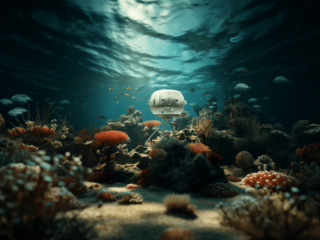You might have heard of greenwashing before. But what about ethics washing? It’s an emerging term that mimics greenwashing but with a few little tricks of its own.
Greenwashing is when companies aren’t as environmentally friendly as they claim to be. More to the point, it’s the process of misdirecting folks through marketing tactics that a company or brand is doing more to protect the environment than it really is.
Ethics washing, or ethics-washing, is when companies deceive folks about making fair and kind choices. In other words, it’s a practice of being loud about ethics without taking meaningful action.
If you pay attention, brands often use buzzwords like ‘fair’, ‘conscious’, ‘caring’, ‘ethical’, ‘cruelty-free’ and ‘responsible’ to construct a convincing act that they’re making a real difference. Labels and messaging peppered with such ethical promises sadly persuade those humans who want to do the right thing – or work at the right place. The problem is that none of these words carry lawful definitions. This means brands hold complete power over what they mean—or what they want you to think it means.
What kind of corporate catfishing is this?
Ergo, Akepa wants folks to know how to spot potential ethics washing. Most of all, to ask questions and verify if the claims companies make are genuine.
As Rafiki told Timon in The Lion King: “Look beyond what you see.”
And it’s not about looking for answers in the clouds.
No, finding the ethical truth is like journeying to the Hakuna Matata jungle hidden beyond the shadows. Getting there often feels like running from cackling hyenas, fighting a wicked lion, and crossing a vast desert in slow motion with dramatic music playing in the background.If only Rafiki could knock some sense into the human race, then everyone would know paradise.
Instead, here are some examples of ethics washing so folks can detect this grimy green crime.
“We follow legal requirements”
As righteous as this statement might sound, it often carries less weight where wages, treatment of animals, and workplace health and safety are concerned.
As things go, local laws in many regions forgo the requirement of a living wage or health and safety policies. Animal cruelty is also systemised into law on a global scale. This allows for cruel slaughtering practices and the painful mutilation of animals. And I’ll be damned, many countries still lack adequate animal protection laws.
As such, it’s essential for companies to take additional action beyond the law to uphold ethical standards.
One way to be sure brands are following legal requirements is to request documentation and certifications. There is a raging sea of standards and certifications for businesses striving for sustainability.
As a case in point, Akepa is certified as a ClimatePartner—one of the global leading climate action companies.
Asante sana squash banana (aka thank you very much in Swahili).
“We pay fair wages”
Fair? There’s no universal measurement of this word in its standalone form.
What if companies consider it fair to pay workers a poverty wage? If a company can’t ensure compensation covers a person’s most basic needs (adequate shelter, food, healthcare, childcare, and so on.), it’s hardly ‘fair’.
Perhaps then ‘living wage’ is a more accurate, or dare I say, fairer measure.
“Materials are ethically sourced”
Yet another fashionably vague statement where ethics washing grows in abundance and animals cry in vain.
If brands promoting animal-derived products are claiming they source their materials from farms that ensure happy animals while keeping the supply chain secret, it’s fishy.
Trust that pungent smell, folks. It’s time to probe.
You can ask them:
- Are any animals confined to a pen or barn lot?
- Are the animals mutilated and/or eventually slaughtered?
- Are injured animals given pain relief?
Generally, the depth of the answers to these questions frequently leads to bleak outcomes. On the contrary, it’s a good sign if a brand offers complete transparency.
“We’re a family”
Here’s another statement that blurs the lines.
Sure, there are companies setting a good example when they mirror relationships in a family context. But, there’s a dark side to this corporate analogy. Families can be dysfunctional and ‘family’ means different things to different folk.
So, when a brand uses this statement, the flip side of the metaphor might sound something like:
We’ll violate boundaries, refuse to compromise, expect unconditional and significant devotion, and be bitter when you prioritise anything else.
Many argue that the workplace-family resemblance affirms unhealthy norms. One article in the Harvard Business Review is on point, calling this structure “toxic”. Put simply, when a business presents itself as a family, boundaries frequently erode in the spirit of a shared purpose.
Still, it all depends on the culture of the company.
An organisation structure should rather create value and provide support to its workers while acknowledging the relationship for what it really is—transactional.
Ethics Washing Vs. Greenwashing
Here’s a quick breakdown to understand the main differences between the two concepts:
- Ethics washing emphasizes people, company culture, labour laws, and sometimes animals.
- Ethics washing isn’t yet regulated.
- Greenwashing emphasizes the environment.
- Greenwashing is becoming regulated, especially in the EU.
- Compared to greenwashing, ethics washing is a touch more targeted at employees and applicants but also customers.
- Both practices are about window dressing a brand or company, so that they seem to do better than they actually are.
- Both practices are about projecting a false image. A company making authentic environmental claims is not greenwashing. Likewise, a company making authentic ethical claims is not ethics washing.
- Both are just plain bad for a business.
Yet, despite those differences there’s a fair chance that greenwashing and ethics washing can appear together as a deceptive duo. Companies eager to exaggerate how good they are for the planet, are likely to also inflate their ethics. What’s more, now that greenwashing is becoming a legal issue, greenwashers may become ethicswashers to capture hearts and minds under the cover of a safer disguise.
Takeaway
At the centre, ethics washing exists to mislead. Making folks believe a brand is more ethical than it really is to capitalise on the mistreatment of others.
Remember, dishonest brands usually can’t or won’t give information beyond what you see. Whereas, committed brands working towards a genuinely ethical operation often proudly showcase or provide details that prove their virtue.There are myriad ethics washing statements that can harm your sustainable business. Get in touch with a sustainable marketing agency if you need help stepping over the slimy banana skins.



Leave a Reply